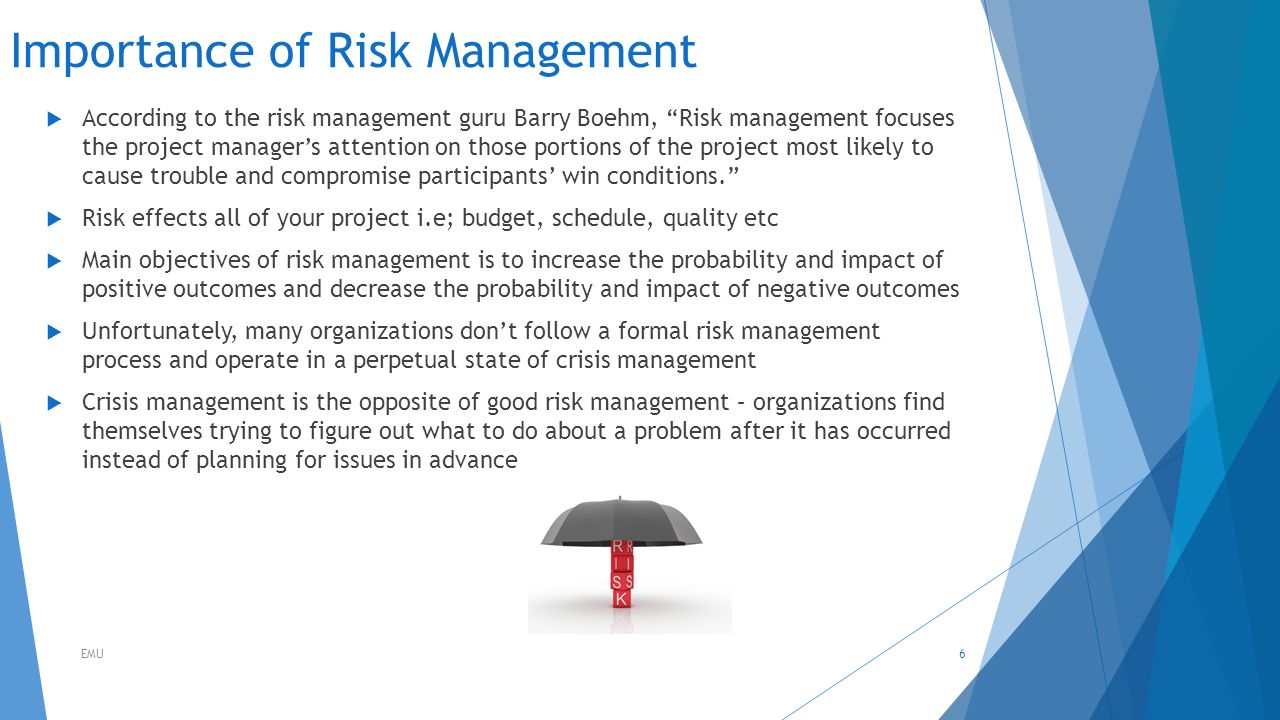Navigating the Difficulties: Understanding the Importance of Risk Management
Navigating the Difficulties: Understanding the Importance of Risk Management
Blog Article
The Relevance of Comprehending the Value of Risk Management in Various Industries

The Core Principle of Risk Management and Its Purpose
Risk Management, the keystone of many sectors, hinges on the identification, evaluation, and reduction of unpredictabilities in a service atmosphere. By correctly determining prospective threats, businesses can develop methods to either protect against these risks from occurring or minimize their impact. Once dangers have actually been identified and reviewed, the reduction process entails designing strategies to reduce their potential impact.
Benefits of Executing Risk Management in Business Operations

Revealing the Duty of Risk Management in Different Industries
While every industry challenges its one-of-a-kind collection of dangers, the implementation of Risk Management strategies remains a common denominator in their pursuit of sustainability and growth. In the medical care industry, Risk Management involves making sure patient safety and security and data security, while in finance, it includes mitigating financial investment threats and making certain governing conformity (importance of risk management). Construction firms concentrate on employee safety, task hold-ups, and spending plan overruns. In the innovation market, companies alleviate cybersecurity hazards and technology obsolescence. Inevitably, the role of Risk Management throughout markets is to identify, analyze, and mitigate threats. It is an important part of critical preparation, making it possible for organizations to protect their assets, take full advantage of possibilities, and accomplish their purposes.
Real-life Study Showing Effective Risk Management
To recognize the value of Risk Management in these lots of markets, one can look to several real-life circumstances that highlight the successful application of these actions. Toyota, publish the 2011 quake in Japan, revised its supply chain Management to reduce disruption dangers. These cases demonstrate exactly how industries, finding out from situations, properly used Risk Management strategies to decrease future threats.
Future Fads and Growths in Risk Management Strategies
As the globe remains to evolve, so as well do the fads and advancements in Risk Management methods. Fast developments in click to find out more technology and information analytics are improving the Risk landscape. Large information and AI are now critical in predicting and minimizing risks. Organizations are leveraging these devices to construct anticipating versions and make data-driven choices. Cybersecurity, when a peripheral issue, has actually catapulted to the forefront of Risk Management, with methods concentrating on discovery, response, and prevention. The combination of ESG (Environmental, Social, Administration) factors right into Risk Management is one more expanding pattern, showing the increasing acknowledgment of the function that environmental and social dangers play in business sustainability. Hence, the future of Risk Management hinges on the combination of sophisticated innovation, innovative methods, and an all natural strategy.
Final thought
In conclusion, recognizing the relevance of Risk Management across a spectrum of sectors is important for their durability and prosperity. Inevitably, effective Risk Management contributes to a lot more resilient and sustainable businesses, highlighting the value of this method in today's highly competitive and dynamic service atmosphere.
While every try these out industry confronts its special collection of dangers, the implementation of Risk Management approaches stays an usual denominator in their search of sustainability and development. In the healthcare market, Risk Management requires ensuring patient security and data protection, while in finance, it includes mitigating financial investment dangers view it and ensuring regulative conformity. Ultimately, the function of Risk Management across industries is to identify, evaluate, and reduce dangers. These cases show how sectors, finding out from situations, properly applied Risk Management strategies to decrease future threats.

Report this page